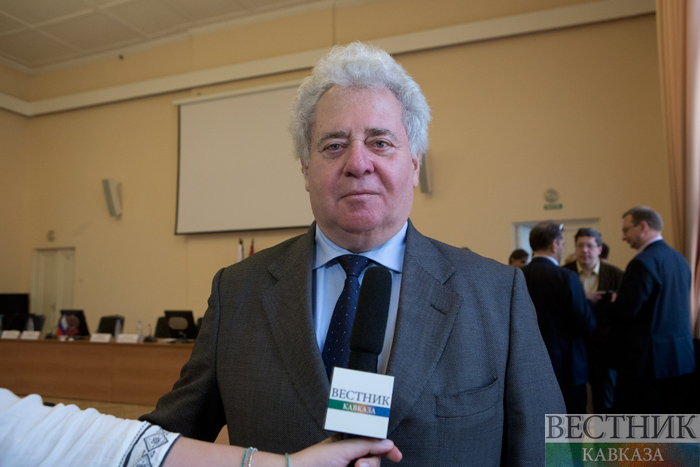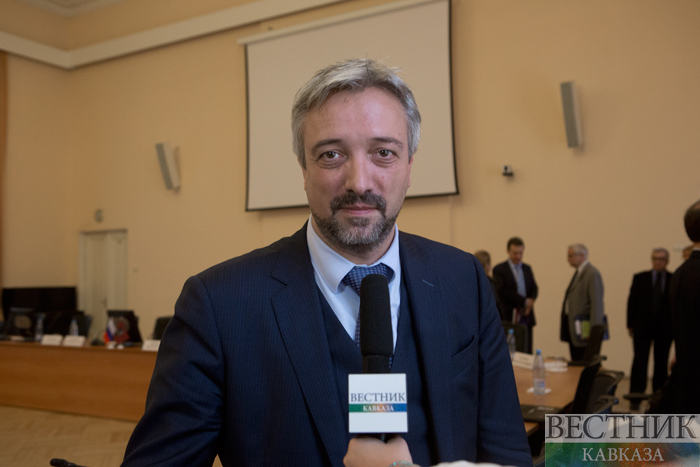In the academic year 2017/18, the Faculty of International Relations and Foreign Regional Studies of the Russian State Humanitarian University and the Russian Humanitarian Mission non-profit organization offer master's degree programme 'Humanitarian Mission of Russia in the Middle East' within the framework of the profile 'Russia and Regions of the World: Political, Economic and Humanitarian interaction'. The program is based on the knowledge of world politics, the foundations of international law, including international humanitarian law, the political systems and culture of the peoples of the Middle East, an interdisciplinary approach to Middle Eastern issues, proficiency in Arabic and English languages, as well as professional competencies in the field of information and communication technologies and 'soft power' tools.
It will explore features of diplomacy of the countries of the region, markets of Islamic financial services, its energy potential and sharia law; It offers practice in the volunteer corps of the world, the Red Cross, humanitarian organizations, as well as the Russian humanitarian mission.

Corresponding Member of the Russian Academy of Sciences, President of the Russian State University for the Humanities, Doctor of Historical Sciences, Professor Yefim Pivovar said that the humanitarian mission is one of the most important activities of the RSUH, the training of its personnel is based on the process of education by knowledge: "The program is aimed at understanding the great Middle East. The humanitarian mission is a direct antipode of the current gross interference in the affairs of other countries, the undermining of their foundations to suit some ideological sentiments or political interests. This is important in terms of promoting Russia's image, Russian language, Russian studies, Russian culture and history. "
"Since the post-Soviet abroad is my area in the Institute for Post-Soviet and Interregional Studies of the Russian State University for the Humanities, it is extremely important for me to develop this trend, because it is somehow linked to our work. Whether it is Central Asia, Tajikistan, Uzbekistan, Kyrgyzstan, Kazakhstan or Turkmenistan, whether it's the South Caucasus, including Azerbaijan, Turkey or Iran, our Caspian region and Afghanistan - it's all connected. We have Arab studies in the Russian State University for the Humanities, there are also directions concerning studying Russian language as a foreign one. But it requires an additional effort. Young people now want to get the maximum result with minimal costs, but efforts for studying this program are large. But they will pay off, because such a specialist will be worth his weight in gold. We are understaffed, so, of course, I welcome this trend in every possible way. When we talk about Islam in the Arab East, we should talk about the religious component both in Azerbaijani modern society and in all countries of Central Asia and in the borderland. There are many crossovers here. Of course, these are political conditions and work among the population. We are interested in these regions having peace, prosperity and positive relations with us," Yefim Pivovar said, speaking to Vestnik Kavkaza.

The director general of the Russian Humanitarian Mission, Yevgeny Primakov, expressed the opinion that discussions about the effectiveness and necessity of soft power have already become common, and Russia's position in the world can be achieved through the mechanisms of translating values: "We must be attractive, we should cause gratitude and sympathy ... National interests of our country are consistent with the security of the region, as well as reducing the cost of implementing our policies there. It's about reducing the resistance, which we and any other player in the Middle East region have to overcome, seeking the necessary influence in providing the necessary context, including down-to-earth things in the form of business contracts and projects. But it is important to understand that Russia's humanitarian policy should be seriously modified in general. "
According to Primakov, the projects implemented in this direction should improve the quality of life of the population, communities and households: "These are medical and educational projects in needy countries and regions, the humanitarian assistance in crisis areas. Even simple delivery of humanitarian aid without securing the last mile, without assessing needs and providing access to assistance, without these boring and completely professional actions and approaches may prove ineffective. Of course, these are cultural projects as well, but exhibitions or concerts cannot replace the pragmatic work "on the ground".






